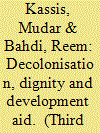| Srl | Item |
| 1 |
ID:
148281


|
|
|
|
|
| Summary/Abstract |
Taking Palestine as the focus of inquiry, and drawing on our experiences as co-directors of Karamah, a judicial education initiative focused on dignity, we reflect on the attributes of colonisation and the possibilities of decolonisation in Palestine through development aid. We conclude that decolonisation is possible even within development aid frameworks. We envision the current colonial condition in Palestine as a multi-faceted, complex and dynamic mesh that tightens and expands its control over the coveted colonial subject but that also contains holes that offer opportunities for resistance or refusal. We turn to Karamah to illustrate how some judges have insisted on a professional identity that merges the concepts of human dignity and self-determination and ultimately rejects the colonial condition inherent in both occupation and development aid. We conclude that in this process of professional identity (re)formation, members of the Palestinian judiciary have helped reveal the demands of decolonisation by demonstrating their commitment to realising human dignity through institutional power, and bringing occupation back into international development discourse.
|
|
|
|
|
|
|
|
|
|
|
|
|
|
|
|
| 2 |
ID:
186979


|
|
|
|
|
| Summary/Abstract |
Using the model of promotion and tenure regulations prevalent in Palestine as an impetus, this article argues that these regulations perpetuate neo-coloniality by localizing and reproducing hegemonic center–periphery relations in academia. This is especially true when it comes to using scientometric criteria in the evaluation of knowledge produced by Arab academics and which gives preference to English language over Arabic language publications, to journals over monographs, and when adopting Western assumptions about the form and substance of academic knowledge production. Consequently, Arab universities expand the reach of Western dominance and its control techniques.
|
|
|
|
|
|
|
|
|
|
|
|
|
|
|
|